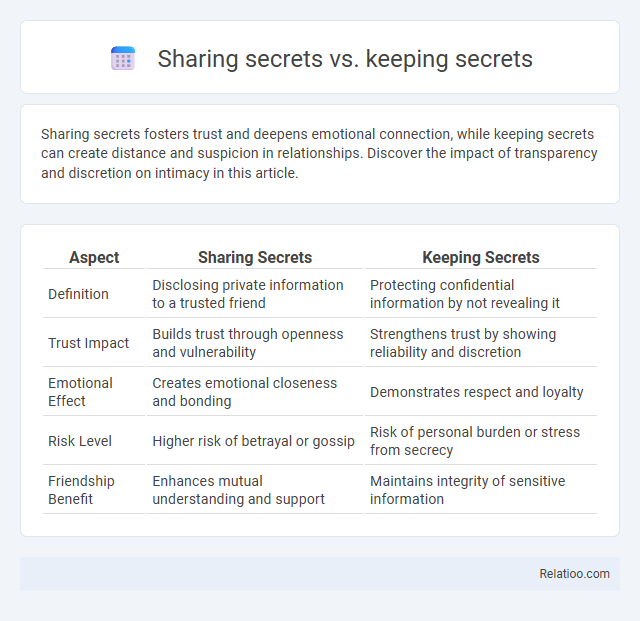Sharing secrets fosters trust and deepens emotional connection, while keeping secrets can create distance and suspicion in relationships. Discover the impact of transparency and discretion on intimacy in this article.
Table of Comparison
| Aspect | Sharing Secrets | Keeping Secrets |
|---|---|---|
| Definition | Disclosing private information to a trusted friend | Protecting confidential information by not revealing it |
| Trust Impact | Builds trust through openness and vulnerability | Strengthens trust by showing reliability and discretion |
| Emotional Effect | Creates emotional closeness and bonding | Demonstrates respect and loyalty |
| Risk Level | Higher risk of betrayal or gossip | Risk of personal burden or stress from secrecy |
| Friendship Benefit | Enhances mutual understanding and support | Maintains integrity of sensitive information |
The Psychology Behind Sharing and Keeping Secrets
The psychology behind sharing and keeping secrets reveals complex emotional and cognitive dynamics influencing trust and vulnerability. Sharing secrets often fosters social bonding and emotional relief by creating intimacy, while keeping secrets can protect privacy and maintain personal boundaries but may also induce stress and anxiety due to the burden of concealment. Research shows that the decision to share or withhold secrets is influenced by factors such as perceived risk, relationship closeness, and individual differences in personality traits like openness and self-disclosure tendencies.
Why We Feel Compelled to Share Secrets
The urge to share secrets stems from a deep psychological need for connection, trust, and validation, as revealing confidential information can strengthen interpersonal bonds and alleviate emotional burdens. Your brain releases oxytocin when you share secrets, enhancing feelings of closeness and trust with others. However, balancing this desire with discretion is crucial to maintain trust and protect sensitive information effectively.
The Benefits of Confiding in Others
Confiding secrets to trusted individuals fosters emotional relief and strengthens interpersonal bonds by promoting vulnerability and trust. Sharing secrets can reduce psychological stress and enhance mental well-being compared to keeping secrets, which may lead to anxiety and isolation. Open communication about secrets often deepens relationships, providing social support and increasing feelings of connection.
Emotional Toll of Keeping Secrets
Keeping secrets can create a significant emotional toll by fostering feelings of isolation, anxiety, and stress as Your mind constantly grapples with hidden information. Sharing secrets, on the other hand, often alleviates this burden by promoting trust and emotional support, reducing mental strain. The impact of a secret depends heavily on its nature and context, but unresolved secrecy tends to amplify emotional distress over time.
Trust and Betrayal: Risks of Sharing Secrets
Sharing secrets involves revealing confidential information that can build or break trust depending on the recipient's discretion. Keeping secrets safeguards your privacy and strengthens relationships, but the risk of betrayal arises when trust is misplaced or secrets are disclosed without consent. Your ability to discern when to share or keep secrets directly impacts trustworthiness and the potential for emotional harm.
The Impact of Secrets on Relationships
Sharing secrets can strengthen trust and intimacy in relationships by fostering vulnerability and openness, while keeping secrets may create distance and suspicion, potentially leading to misunderstandings and resentment. The nature of the secret--whether it is protective or harmful--significantly influences its impact, with harmful secrets often eroding the foundation of trust. Maintaining transparency and carefully evaluating which information to share or withhold is crucial for preserving healthy and resilient relationships.
When Is It Ethical to Share a Secret?
Sharing secrets can be ethical when it protects someone's well-being or prevents harm, such as disclosing abuse or safety threats. Keeping secrets respects personal boundaries and trust, especially when the information is private and sharing it could cause unnecessary pain. You must evaluate the potential impact on all parties involved, balancing confidentiality with moral responsibility.
Healthy Ways to Handle Sensitive Information
Handling sensitive information requires balancing sharing secrets and keeping secrets to maintain trust and emotional well-being. You should evaluate the context and the potential impact on relationships before deciding whether to share or keep a secret, ensuring respect for confidentiality and personal boundaries. Practicing clear communication, empathy, and discretion promotes healthy ways to manage secrets without causing harm or breaching trust.
Cultural Perspectives on Secrecy
Cultural perspectives on secrecy reveal distinct attitudes toward sharing secrets and keeping them, where collectivist societies often emphasize maintaining secrets to preserve group harmony and trust. Individualistic cultures may prioritize sharing secrets as a way to build personal relationships and assert autonomy. Understanding these differing approaches highlights how secrecy functions as a social tool influenced by cultural values surrounding communication, trust, and privacy.
Finding Balance: Deciding What to Share and What to Keep
Finding balance between sharing secrets and keeping secrets requires careful consideration of trust, context, and the potential impact on relationships. Sharing secrets can foster intimacy and strengthen bonds when done thoughtfully, while keeping secrets protects privacy and prevents harm. Assessing the nature of the secret and the intentions behind disclosure ensures decisions align with personal boundaries and ethical responsibility.

Infographic: Sharing secrets vs Keeping secrets
 relatioo.com
relatioo.com